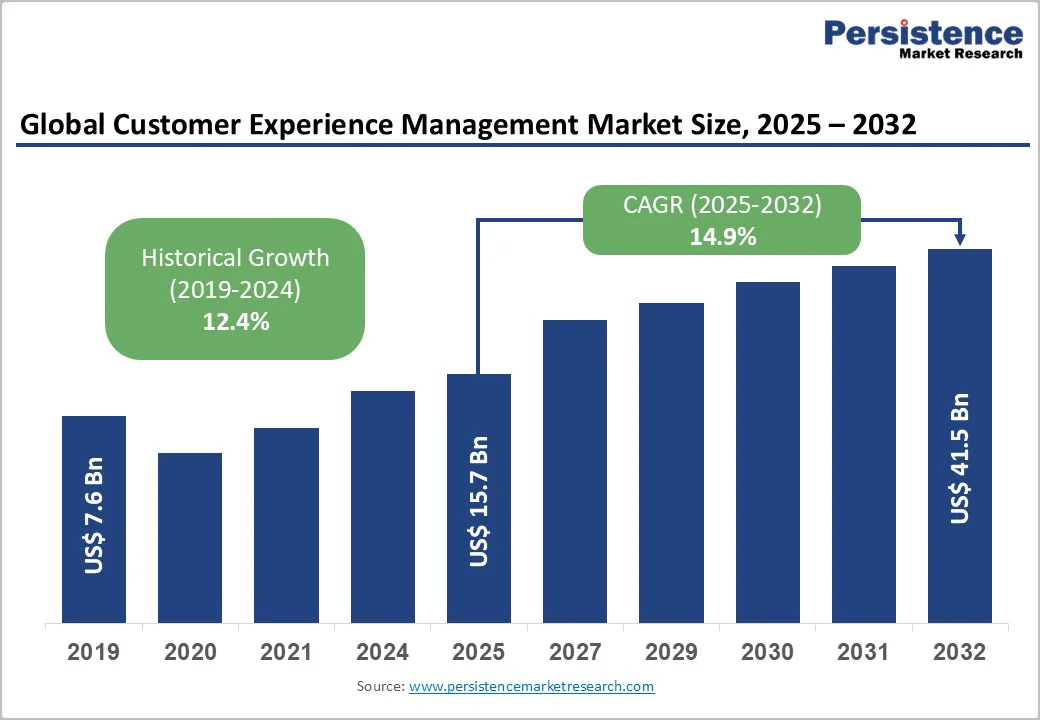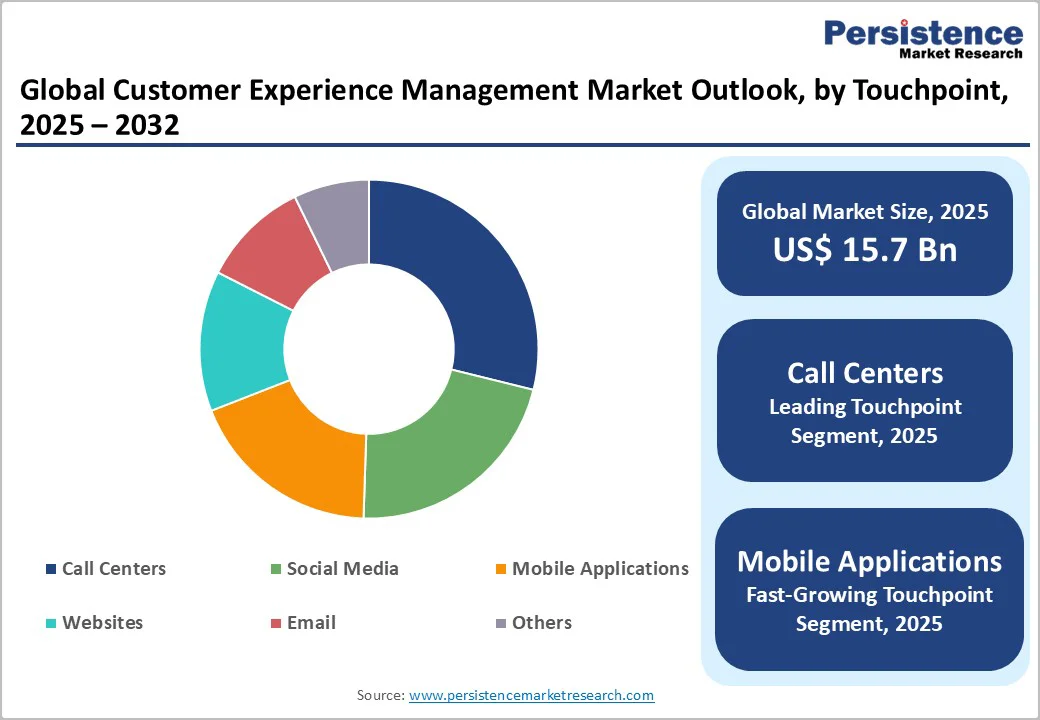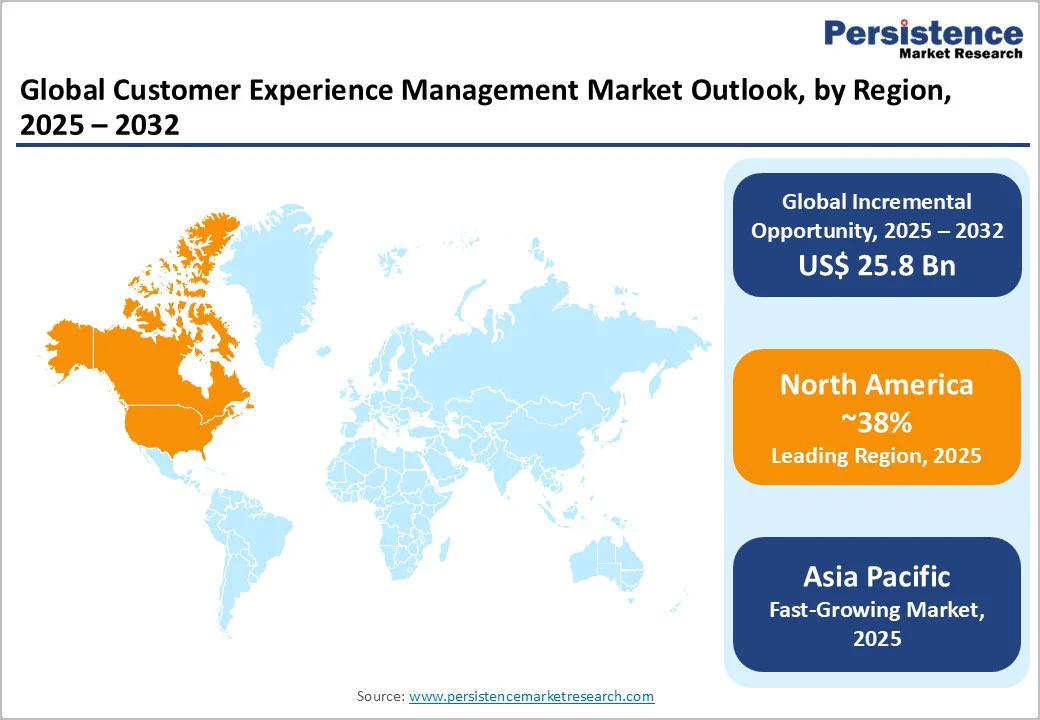ID: PMRREP33042| 193 Pages | 26 Nov 2025 | Format: PDF, Excel, PPT* | IT and Telecommunication

The global customer experience management market is expected to reach US$15.7 billion in 2025. It is expected to reach US$41.5 billion by 2032, growing at a CAGR of 14.9% during the forecast period from 2025 to 2032, driven by organizations’ increasing focus on delivering personalized, seamless, and consistent interactions across diverse touchpoints.
As digital transformation advances, rising customer expectations, powered by omnichannel engagement, are pushing businesses to adopt comprehensive CXM solutions. Expanding e-commerce activity, widespread mobile usage, and greater social media interaction are further accelerating demand.
| Key Insights | Details |
|---|---|
|
Customer Experience Management Market Size (2025E) |
US$15.7 Bn |
|
Market Value Forecast (2032F) |
US$41.5 Bn |
|
Projected Growth (CAGR 2025 to 2032) |
14.9% |
|
Historical Market Growth (CAGR 2019 to 2024) |
12.4% |

The growing need for seamless omnichannel customer experiences across social media, email, websites, mobile apps, and voice channels is driving CXM adoption. According to Salesforce, 69% of agents struggle to balance speed and service quality, while 81% of agents and 73% of mobile workers report rising expectations for personalized interactions.
Unified, cloud-based CXM platforms enable real-time data integration, customized engagement, and scalable analytics, helping organizations retain customers cost-effectively. Post-pandemic hybrid work models further accelerate digital-first engagement, allowing distributed teams to deliver consistent, proactive, and loyalty-building customer experiences.
The adoption of AI-powered chatbots, virtual assistants, and automation is transforming customer experience by reducing response times and operational costs while enhancing engagement. Advanced analytics and machine learning enable businesses to anticipate customer needs, deliver personalized experiences, and resolve issues proactively.
Studies show that AI automation can cut first response times by over 35% and resolve tickets about 50% faster. With AI adoption in operations reaching around 70% and 80% of service/support organizations expected to implement generative AI by 2025, technologies such as NLP, predictive analytics, and real-time sentiment analysis are driving efficiency, consistency, and customer satisfaction across multiple touchpoints.
CXM platforms require substantial upfront investments in software, infrastructure, and professional services, as well as organizational change management. Enterprises face challenges integrating CXM with legacy systems, migrating customer data, training staff, and reconfiguring processes, which extend implementation timelines and increase total cost of ownership.
Smaller and mid-market companies often struggle with these adoption barriers due to limited budgets. Although services addressing implementation and optimization are growing, high integration and deployment costs continue to limit adoption, particularly among cost-sensitive SMEs.
Heightened focus on customer data privacy and evolving regulations create significant operational challenges for CXM adoption. Organizations must balance personalization with compliance, implementing data minimization, consent management, and audit trails. Call centers, as dominant touchpoints, face scrutiny over call recording, data retention, and consent practices.
Stringent requirements particularly impact the healthcare and BFSI sectors. By the end of 2024, data-protection laws covered 6.3 billion people, and as of early 2025, 144 countries had privacy laws; according to Cisco’s 2025 Data Privacy Benchmark Study, 95% of customers would avoid businesses that fail to protect their data.
Tactile IoT (TIoT) enables real-time, haptic-enabled interactions, while AR/VR allows virtual product trials, interactive showrooms, and immersive storytelling, enhancing engagement and satisfaction. Voice, gesture, and AI-driven interactions deliver seamless, intuitive communication across digital touchpoints, enabling hyper-personalization, predictive services, and proactive issue resolution.
CXM platforms leveraging these technologies help brands differentiate, increase customer retention, and drive loyalty. Reflecting this shift, the 2024 VERINT digital customer experience report shows that, for the first time, more customers preferred digital channels (61%) over phone (39%) for service queries.
Integration of CXM platforms with CRM, marketing, and ERP systems presents a significant growth opportunity by enabling a 360-degree view of customers. Seamless data flow allows organizations to personalize interactions, anticipate needs, and deliver consistent omnichannel experiences.
Marketing automation drives targeted campaigns, while ERP connectivity ensures operational data informs CX strategies, enhancing service efficiency and order fulfillment. This integration reduces silos, streamlines workflows, and provides actionable insights for decision-making, helping businesses strengthen customer loyalty, optimize cross-selling, and boost revenue. Currently, 58% of companies use integrated ERP and CRM systems, underscoring the rising demand for unified CXM solutions globally.
Software/Platforms are expected to account for more than 55% of the market share in 2025 as organizations increasingly need unified tools to manage customer interactions across multiple channels. These platforms enable real-time data collection, analytics, and personalization, addressing the growing demand for seamless omnichannel experiences. They also support AI-driven automation, predictive insights, and integration with marketing and ERP systems, helping businesses enhance customer satisfaction, loyalty, and operational efficiency.
Services are projected to grow at the highest rate as organizations increasingly need to deliver seamless, personalized experiences across multiple touchpoints. Operational and management services address critical day-to-day customer interactions, ensuring efficiency and satisfaction. Digital services such as customer journey mapping and CX analytics powered by machine learning help companies optimize engagement strategies, predict customer behavior, and drive long-term loyalty, making services a high-growth segment.
On-premises is expected to account for over 47% of the market share, as organizations prioritize data control, security, and customization. Many enterprises that handle sensitive customer information prefer maintaining full ownership of their data and integrating CXM with existing internal systems. On-premises deployments also allow tailored workflows and real-time performance monitoring, meeting the needs of industries such as finance, healthcare, and government, where compliance and privacy are critical.
Cloud-based solutions are expected to grow at the fastest CAGR, driven by scalability, flexibility, rapid deployment, and cost efficiency advantages. SaaS-based CXM platforms eliminate significant capital expenditure, enable subscription-based economics, and facilitate rapid feature updates without customer deployment burden. Modern cloud CXM solutions address security and compliance concerns through certifications (SOC2, ISO27001, HIPAA compliance), encrypted data transmission, and regional data residency options.
Call centers are expected to account for more than 32% of the market share, due to their role as the primary touchpoint for customer interactions. They efficiently manage high volumes of inquiries, complaints, and support requests while addressing the growing need for personalized service and 24/7 accessibility. Integration with CXM platforms allows call centers to capture insights, track customer journeys, and improve overall satisfaction. Modern call center software further enhances performance with AI-powered speech analytics, sentiment analysis, predictive dialing, intelligent routing, and real-time agent assistance.
Mobile applications are expected to grow at the highest CAGR, reflecting consumer preference for mobile-first, on-demand interactions. Mobile CXM capabilities include push notifications, in-app messaging, location-based personalization, and mobile payments integration. Organizations view mobile as essential for customer engagement, as contemporary consumers expect seamless, app-based experiences. Mobile CXM solutions enable real-time personalization using customer behavior and preferences to deliver timely, contextual messages.
Retail & e-commerce is expected to account for more than 25%, driven by the need for personalized, seamless shopping experiences. Consumers increasingly expect real-time support and omnichannel engagement across websites, apps, and social media. High competition encourages retailers to leverage CXM tools to retain loyal customers, resolve queries efficiently, and generate data-driven insights. CXM platforms enable real-time inventory visibility, personalized recommendations, dynamic pricing, and customer loyalty programs to optimize engagement and retention.
Healthcare represents the fastest-growing segment, due to rising patient demand for personalized and seamless care. Growing telehealth services, digital appointment scheduling, and real-time communication are driving the adoption of advanced CXM solutions. Regulatory pressures to improve patient experience and data management are further accelerating investments in CXM platforms by hospitals and clinics to streamline workflows and enhance overall care quality.

North America leads the customer experience management market, accounting for over 38% of the global share in 2025, with the U.S. contributing more than 75% of North America’s share. Mature enterprise digitalization, advanced IT infrastructure, high IT spending, and early CXM adoption drive growth, supported by leaders such as Salesforce, Oracle, and emerging innovators.
Cloud-based SaaS, AI-driven automation, e-commerce expansion, and healthcare digital transformation further boost adoption, while regulations, including CCPA, HIPAA, and other industry-specific mandates, promote compliance-driven CXM investments. Government initiatives reinforce digital expectations: the USDS reports a 53 % rise in SSA.gov customer satisfaction for 180 million annual users, and Canada’s “Digital Ambition 2024-25” shows 77 % of Canadians connected with government online, 60% in the past year, though only 22.5% of services were fully digital in 2022-23.
Asia Pacific is the fastest-growing region, driven by rapid digital transformation, rising consumer expectations, and strong manufacturing and services sectors. China leads the area with 1.1 billion internet users, 78.6% penetration by December 2024, and high online consumer spending, while India shows fast growth through IT services expansion and digital government initiatives, for example, a customer experience score of 64.75/100 in 2024. India's customer experience management market size is likely to increase at US$1,137.5 million in 2025 to US$3,496.2 million by 2032
Widespread internet connectivity, mobile adoption, and advanced ICT infrastructure enable analytics, omnichannel engagement, and real-time personalization. Mobile technologies contributed US$950 billion, 5.6 % of GDP, to APAC’s economy in 2024, underscoring the growing need for CXM tools across private and public sectors.
In Europe, CXM adoption is strongly shaped by regulations such as GDPR, driving investment in privacy-compliant solutions. E-commerce growth and the rapid shift to digital channels, as noted by Eurostat, where 77% of EU consumers shopped online in 2024, up from 59% in 2014, fuel demand. Enterprises are increasingly integrating AI 13.5% of EU enterprises in 2024 and analytics to optimize customer journeys.
Cloud adoption is also significant, with 45% of EU businesses using cloud services in 2023. Firms across retail, telecoms, and financial services invest in omnichannel CXM to deliver seamless experiences across diverse languages, cultures, and devices. SMEs are also adopting these tools to enhance loyalty, digital service performance, and competitiveness.

The global customer experience management market is largely fragmented, with international and regional players competing through solution innovation, including AI-driven analytics, omnichannel engagement, and personalized customer journeys. Companies are leveraging strategic partnerships, competitive pricing, and flexible subscription models to expand reach, while emphasizing customer success and business outcome optimization to ensure effective adoption and ROI.
The customer experience management market is projected to reach US$15.7 Billion in 2025.
The growing need for businesses to deliver personalized, seamless, and consistent experiences, enhancing customer satisfaction, loyalty, and long-term retention, is a key driver of the market.
The customer experience management market is poised to witness a CAGR of 14.9% from 2025 to 2032.
Rising adoption of IoT, AR/VR, and new interaction modes, along with the growing demand for data-driven solutions, is creating strong growth opportunities.
SAP SE, Adobe Inc., Oracle Corporation, IBM Corporation, and Open Text Corporation are among the leading key players.
| Report Attribute | Details |
|---|---|
|
Historical Data/Actuals |
2019 - 2024 |
|
Forecast Period |
2025 - 2032 |
|
Market Analysis |
Value: US$ Bn |
|
Geographical Coverage |
|
|
Segmental Coverage |
|
|
Competitive Analysis |
|
|
Report Highlights |
|
By Offering
By Deployment
By Touchpoint
By Industry
By Region
Delivery Timelines
For more information on this report and its delivery timelines please get in touch with our sales team.
About Author